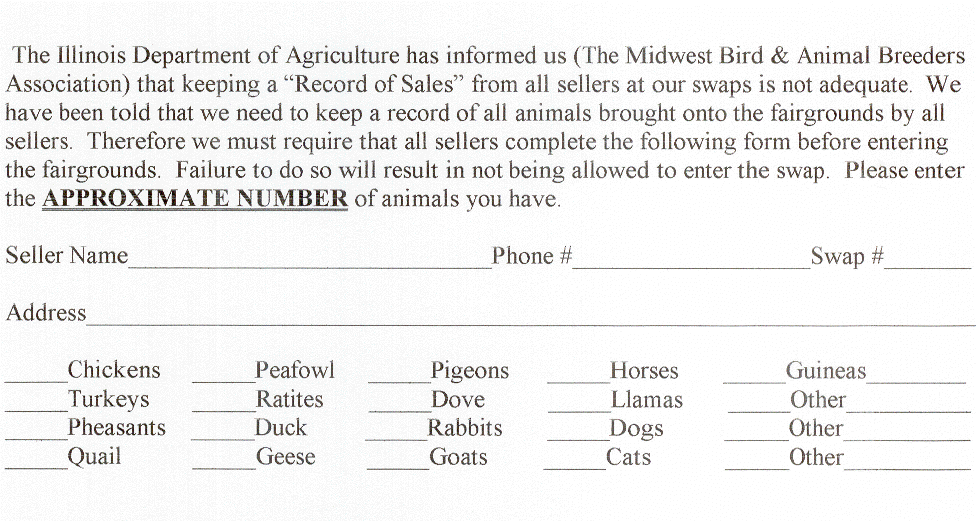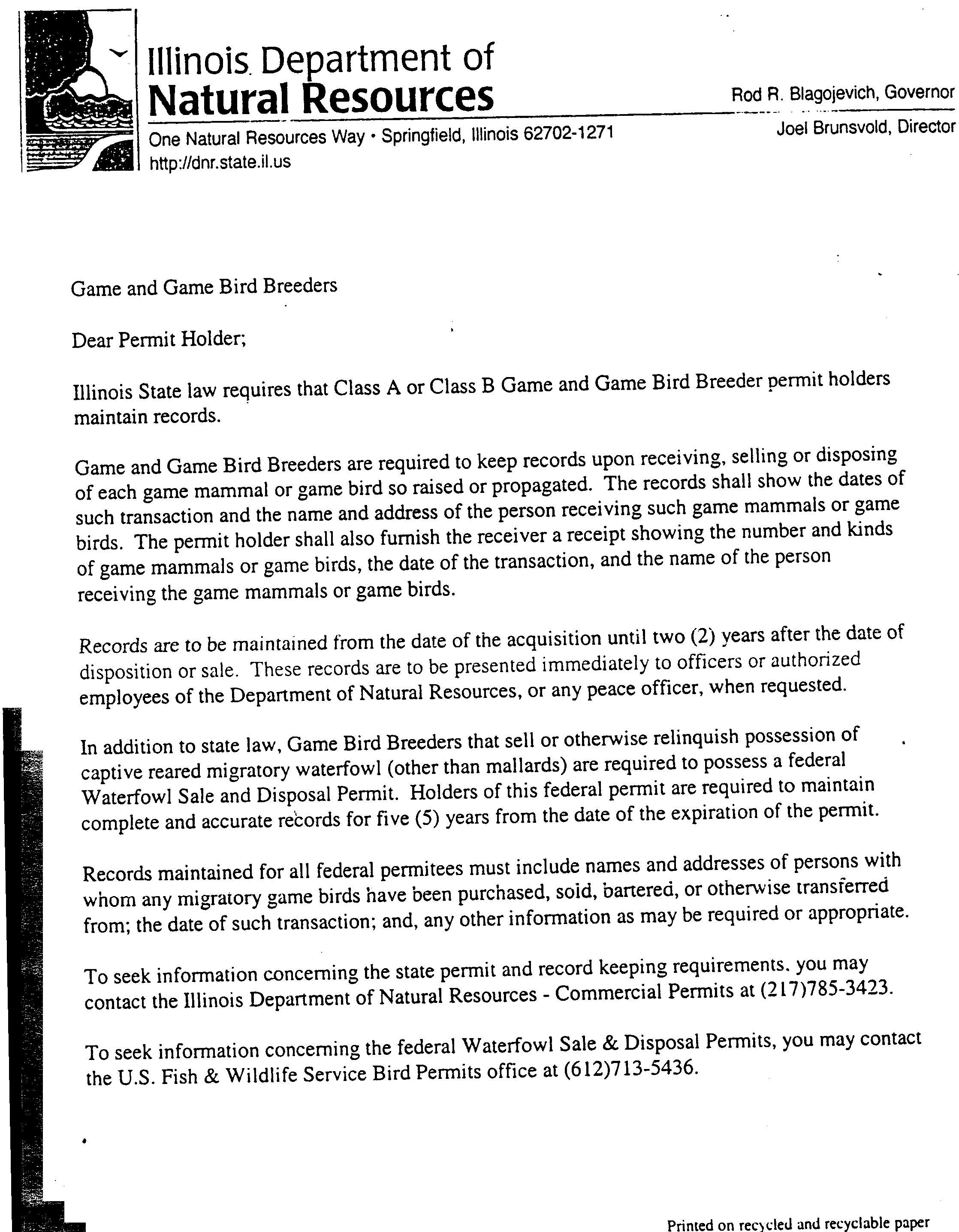
ILLINOIS
DEPARTMENT OF NATURAL RESOURCES
WATCH HERE FOR NEWS FROM THE IDNR.
REQUIRED!
ANY BIRD
OR ANIMAL BROUGHT IN FROM OUTSIDE ILLINOIS MUST HAVE A PORT OF
ENTRY
NUMBER ISSUED BY THE STATE OF ILLINOIS WITHIN 48 HOURS PRIOR TO
ENTRY.
NUMBERS ARE ISSUED 24 HOURS PER DAY, 7 DAYS PER WEEK. CALL 217-782-4944.
REQUIRED!
ALL POULTRY, EXCLUDING
WATERFOWL, IS REQUIRED BY THE STATE OF ILLINOIS TO BE
TESTED PULLORUM-TYPHOID CLEAN BEFORE BEING EXHIBITED OR SOLD AT SHOWS OR
SALES.
PLEASE HAVE THIS DONE BEFORE SWAP DATES. CONTACT THE STATE TESTER
IN YOUR AREA.
REQUIRED!

FOR IMMEDIATE RELEASE
January 14, 2003
To: Wild Game and Bird Breeder Permit Holders
Wild Game and Bird Breeder Permit holders import game birds from other states for sale and release in Illinois. During the past several months the poultry and game bird industries in the State of California have experienced an Exotic Newcastle Disease outbreak. The outbreak has resulted in the depopulation of over one million poultry and captive-reared game birds in several counties in California. The purpose of this letter is to provide information about Exotic Newcastle Disease and to notify permit holders about import restrictions on captive-reared game birds from California.
Exotic Newcastle Disease (END) is a viral disease that affects captive-reared game birds, poultry, as well as most other bird species. END is spread in several ways with the virus remaining viable for several weeks in a warm humid environment and indefinitely in frozen material. In END outbreaks entire flocks of game birds or poultry are quarantined and subsequently euthanized to contain the outbreak. The result is significant economic loss to individual producers and the game bird industry. Prevention is accomplished by practicing biosecurity and by ensuring that game birds and poultry are not exported from infected flocks.
The Illinois Department of Natural Resources (IDNR) is implementing measures to ensure that END is not brought into Illinois via imported animals or feathers from California. The IDNR strongly advises Wild Game and Bird Breeder Permit holders not to acquire game birds, chicks, eggs, or feathers from California sources. Permit holders are advised to query their game bird suppliers to ensure that game birds purchased do not have an indirect origin from suppliers in California.
Should a permit holder intend to import game birds, chicks, eggs, or feathers from California, the IDNR will require notification that such animals or feathers have been inspected and certified disease free prior to importation. The inspection and disease free certification must be accomplished by a licensed veterinarian acceptable to the IDNR. The IDNR must be notified of the intent to import from California at least thirty days prior to importation.
If there are questions about this information or to notify the IDNR about the intent to import from California, please contact me by telephone at 217/782-6752, or by e-mail at tmusser@dnrmail.state.il.us. Thank you for your cooperation.
Sincerely,
Terry L. Musser, Program Manager

FOR IMMEDIATE RELEASE
June 11, 2002
To: Wild Game and Bird Breeder Permit Holders
Wild Game and Bird Breeder Permit holders import game birds from other states for sale and release in Illinois. During the past several months the poultry and game bird industries in the states of Virginia and North Carolina have experienced an avian influenza outbreak. The outbreak has resulted in the depopulation of over 3 million poultry and captive-reared game birds in those states. The purpose of this letter is to provide information about avian influenza and to notify permit holders about import restrictions on captive-reared game birds from the states of Virginia and North Carolina.
Avian influenza (Al) is a viral disease that affects captive-reared game birds, poultry, as well as other bird species. Al is spread in a variety of ways with the virus remaining viable for a few weeks to several months depending on the environment. In highly pathogenic Al outbreaks entire flocks of game birds or poultry have been euthanized to contain the outbreak resulting in significant economic loss. Prevention is accomplished by practicing biosecurity and by ensuring that game birds and poultry are not exported from infected flocks.
The Illinois Department of Natural Resources (IDNR) is implementing measures to ensure that Al is not brought into Illinois via imported game birds, chicks, or eggs from the states of Virginia and North Carolina. The IDNR advises Wild Game and Bird Breeder Permit holders not to acquire game birds from Virginia or North Carolina sources. Permit holders are advised to query their game bird suppliers to ensure that the game birds purchased do not have an indirect origin from suppliers in Virginia or North Carolina.
Should a permit holder intend to import game birds, chicks, or eggs from the states of Virginia or North Carolina, the IDNR will require notification that such animals have been inspected and certified disease free prior to importation. The inspection and disease free certification must be accomplished by a licensed veterinarian acceptable to the IDNR from the state in which the animals originate.
If there are questions about this information, please contact me by telephone at 217/782-6752 or e-mail at tmusser@dnrmail.state.il.us. Thank you for your cooperation.
Sincerely,
Terry L. Musser, Program Manager
FOR IMMEDIATE RELEASE
April 19, 2002
IMPORT OF DEER AND ELK BANNED
TO PREVENT SPREAD OF CHRONIC WASTING DISEASE
SPRINGFIELD, Ill. -- Emergency rules were filed today banning the importation of captive deer and elk
into Illinois in a continuing effort to prevent Chronic Wasting Disease from coming into the state.The new rules filed by the Illinois Department of Agriculture also require a permit to be obtained by an
owner before any captive deer or elk change ownership or move within the state. In addition, the animals must come from a herd enrolled in a monitored herd program. The new rules take effect immediately."We must take this action to keep Chronic Wasting Disease out of Illinois, to protect our farmers who
raise captive herds of deer and elk and to protect our wild herds," said Illinois Agriculture Director Joe Hampton. "We appreciate the assistance we have received from owners of captive herds and sportsmen in implementing these changes and in monitoring the health of deer and elk in the state."The import ban was recommended by a task force of key staff from the Departments of Agriculture and
Natural Resources. The emergency rule will remain in place for no more than 150 days, until a new rule is adopted. The task force is continuing to gather information and develop strategies for addressing Chronic Wasting Disease issues."There are still a lot of unknowns regarding Chronic Wasting Disease. We want to take every necessary
precaution to prevent CWD from coming into Illinois," IDNR Director Brent Manning said. "This step is not a permanent solution, but allows us time to assess what's occurring on the national landscape. During the coming weeks and months, we will be working together to put additional safeguards in place."Chronic wasting disease is a fatal neurological disease found in deer and elk. The disease attacks the
brains of infected animals, causing them to become emaciated, display abnormal behavior, lose coordination and eventually die. Although Chronic Wasting Disease never has been diagnosed in Illinois, the disease has been found in captive deer and elk herds in Colorado, Kansas, Nebraska, Montana, Oklahoma, South Dakota and the Canadian provinces of Saskatchewan and Alberta. It has also been confirmed in wild deer herds in Colorado, Wyoming, Nebraska and Wisconsin.Scientists test for Chronic Wasting Disease by examining the brain tissue of animals.
Illinois
regulations require that any captive cervid (member of the deer/elk family) that dies from an unknown cause and has exhibited a neurological disorder must be tested for Chronic Wasting Disease.Programs are in place for establishing Certified Monitored Chronic Wasting Disease herds for captive deer and elk and Contained Monitored Chronic Wasting Disease herds for captive deer.
Illinois has participated in a "targeted surveillance program" for Chronic Wasting Disease in wild deer for about 5 years, since that approach was first proposed by the Southeastern Cooperative Wildlife Disease Study, a diagnostic and research service which investigates wildlife diseases. In this program, deer that exhibit symptoms that could be caused by Chronic Wasting Disease are submitted for testing by an approved laboratory. During the fall 2001 shotgun deer season, Illinois officials also systematically sampled hunter-harvested deer from around the state for testing. To date, no animals from Illinois have tested positive for Chronic Wasting Disease, but surveillance efforts for the disease are being expanded in response to the diagnosis of the disease in Wisconsin.
Jeff Squibb - IDOA www.agr.state.il.us
217-785-9272
Carol Knowles - IDNR www.dnr.state.il.us
217-785-0970
[ HOME ] [CONTACT US]